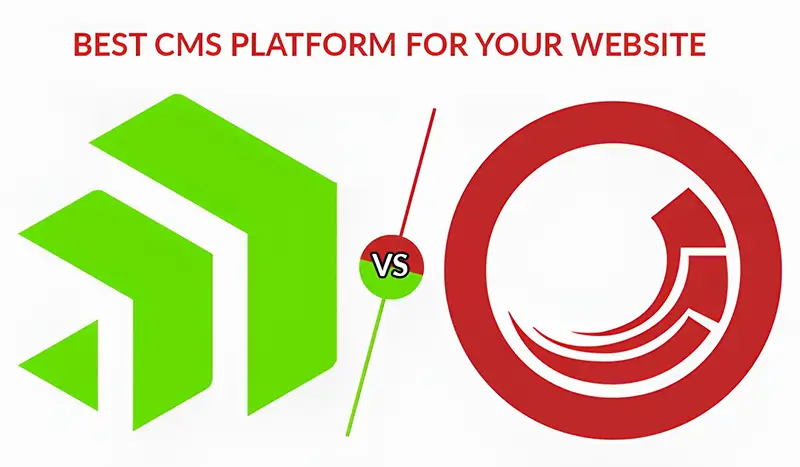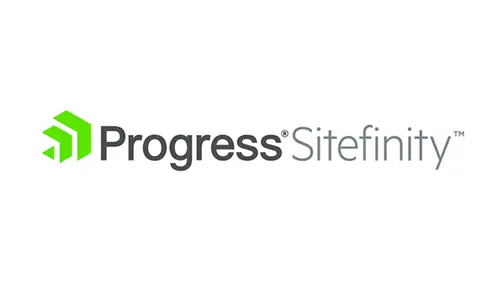From a business owner aspect, it’s vital to know what kind of CMS platform could be better for their website. There are quite a numbers of CMS platform to build a website but today we are going to 2 of the best CMS platforms for website: Sitefinity vs Sitecore. Before moving on to this let us first have some basic ideas on “What is a Content Management System (CMS)?”
A Content Management System (CMS) is a software program which allows designing, manage and update dynamic websites. Directly installed on the company’s website, the management interface can be used from a web browser.
Sitefinity is a CMS which is used for creating, storing, managing and presenting the content on the website. In so, the content and page of Sitefinity are multilingual and a person can use a single instance of Sitefinity to manage multiple sites that can share content. It is designed for flexibility and scalability to give teams the freedom that they need to integrate external application or use third-party modules.
In the other hand, Sitecore is a CMS which enables the creation of sophisticated and attractive web solutions for business. Sitecore also enables web content publisher and marketing specialities to fully control all the aspects of their website, counting form social integration to advanced personalization, e-commerce, and many more. It is similar to a powerful, fully customizable Windows desktop interface, which allows new Sitecore users to quickly become familiar with the system.
CMS Comparison: Sitefinity vs Sitecore
Let’s first discuss the common points of these two giants of web content management. Sitefinity and Sitecore are both used by major international companies. They use the ASP.NET framework (a framework that is used to generate dynamic web pages). They have a clear and flexible interface which makes it easy to create content.
Now let’s discuss on some of the Pros and Cons of these two CMSs.
Pros and Cons of Sitefinity
Pros
- It makes it easy for an administrator to assign roles for others in the organisation to contribute content.
- It also makes it easy for an administrator to know when new content has been created and is ready to be reviewed and approved.
- Sitefinity CMS’s licensed model makes it very affordable for a small and medium-sized business to adopt the platform.
- They always continue to update the platform with new features.
Cons
- Well, it doesn’t go well with Chrome. Some vendor only use chrome as their default browser, but there are so many things that don’t work in Chrome that are no longer been used
- Sitefinity doesn’t have an in-text editor. On small updates, it would be nice to click an edit button on a page and either fix it right there or at least use that button to open that page in Sitefinity.
- Everybody hates when they are editing a page, finish, and go back into the Pages menu and the menu that they were working on is closed, or a different one is open. It’s kind of frustrating.
Pros and Cons of Sitecore
Pros
- Personalisation of advertising banners based upon knowledge of the customer, like location or previous searches enables to target customers with products and offers that they are more likely to engage with, which has been done to good effect.
- The use of Sitecore for content management enables the business and design team to perform changes to things, like images, content and page structure, which would otherwise have required a code release, which is costly in terms of manpower.
- The A/B testing in Sitecore is good because it allows to statistically verify minor changes to the site – like advert changes or component ordering on the page – as to whether or not they positively impact conversion.
Cons
- Sitecore is a Customer Engagement Platform. It comes with lots of features, but most of them are not being used by many clients. If someone is looking for just CMS (only authoring and publishing), then Sitecore is not the way to go.
- A strong certified Sitecore developer is needed to manage the Sitecore platform (if all features are being used). It’s the same case with others. But, finding a Sitecore certified developer is tough in the market and expensive too. Now the market is and Sitecore is gaining popularity, it may be easy to find such developers in the future.
- Sitecore comes with lots of built-in features and marketplace components (it’s a tricky situation). It allows a normal developer to use some of the free marketplace module, which may or may not support in a future version of Sitecore and for which it may put the entire platform in risk to upgrade to the latest version.
Sitefinity offers many more features than Sitecore and it integrates with many more systems and business applications (better support, more options for implementation of distribution etc.). In terms of marketing management, Sitefinity offers more features including customization that allows anyone to identify their targets and create content that meets their needs. The creation of content and publications is simplified thanks to the drag and drop, the many templates and themes, the very good responsive management. Content management is also a strong point, with a highly optimized SEO management module and community management support.
Which one would be the best CMS: Sitefinity vs Sitecore?
From observation, both CMSs get similar user satisfaction and this shows that both systems are worth it. However, Sitefinity has been on the market for much less than its competitor and yet it presents itself as its most serious challenger. If Sitecore is still in a leading position, it is also thanks to its seniority on the market. Since its creation, Sitefinity has experienced an impressive growth allowing it to match Sitecore and even surpass it in many areas.
And for the Sitefinity CMS Pricing part, it depends on what subscription package, version, etc. you choose and according to that the pricing changes. The best way to know is to refer to Progress Sitefinity website.
If you are contemplating on technical considerations before choosing your CMS framework for your business web portal, OR wishing to migrate to Sitefinity, just drop an email to us. OdiTek Solutions has some of the best Sitefinity developers in India. If you need more information or wish us to assist in analyzing you, do reach out to us on – info@oditeksolutions.com







